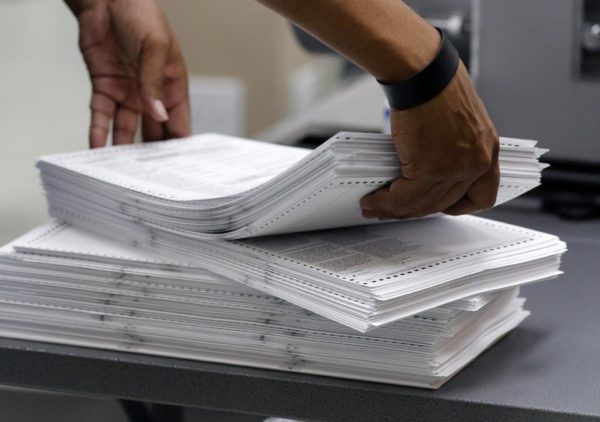
FEC Chair Ellen L. Weintraub speaks at a panel discussion on disinformation and the 2020 campaign. (Paul Morigi/Getty Images/PEN America)
In a politically apocalyptic year, with the threat of foreign interference in the 2020 election looming, one thing has been constant: You could set your watch to the Federal Election Commission’s digest showing up online.
The latest in election regulatory activity has published every Friday in 2019 and has posted in a similar frequency going back to 2009. The only recent disruption was the government shutdown that began around Christmas last year.
That was until this Friday, after what FEC Chair Ellen L. Weintraub said was a Republican commissioner’s effort to block a draft memo on prohibited foreign national electoral activity from being included in the digest, which led to the digest being withheld from the public.
But Weintraub found a way to get the information out.
“Funny story,” she began in a Friday tweetstorm.
The Democratic chairwoman published the digest in piecemeal, with 57 tweets in all, including the foreign national prohibitions memo — all while calling out the commissioner who she said sought to block it from being widely publicized online.
“GOP FEC Commissioner Caroline Hunter took the altogether unprecedented step of objecting to its being added to the Digest and blocked publication of the whole,” Weintraub said, referring to the memo.
“I always thought these anti-regulatory people liked the First Amendment well enough,” Weintraub said in a follow-up tweet. “I guess they think it’s just for corporations. I’m not fond of anyone trying to suppress my speech.”
The digest itself was fairly routine and mostly included updates on civil penalties handed down for campaign law violations.
But Weintraub’s defiance is notable for its timing, as foreign involvement in the U.S. political system has turned the news cycle into a very focused dumpster fire.
An intelligence community whistleblower said President Trump may have improperly pressured Ukraine’s president to investigate the son of former vice president Joe Biden, a leading contender for the 2020 Democratic presidential nomination, prompting lawmakers to consider impeachment.
[U.S. attorney warns of possible Russian interference in 2020 elections]
A critical mass of Washington officials have said Russia interfered in the 2016 election and have emphasized the integrity of the 2020 elections as a key focus across the government. Top intelligence and technology officials briefed Congress on preparations this summer, and Joseph Maguire, acting director of national intelligence, told lawmakers Thursday that election security is his agency’s “most fundamental priority.”
There is one notable dissenter on the seriousness of a foreign threat to elections: Trump. The Washington Post reported Friday that Trump told Russian officials in 2017 that he was unconcerned over their 2016 interference because, he said, the United States conducts similar disruption campaigns.
Election integrity is a key focus for the FEC, and Weintraub has often raised the issue from her perch. Her memo focuses on financial contributions from foreign nationals for all U.S. elections, for which there are broad restrictions that she summarized in a June op-ed in The Post.
“I am gravely concerned about ongoing efforts by geopolitical adversaries to undermine our democracy,” Weintraub wrote. “It is critically important that everyone involved in U.S. politics understands the law, recognizes the threat, and confronts and contains it.”
Reached Saturday, Weintraub told The Washington Post: “It’s a straightforward summary of how the FEC has interpreted the foreign national ban over the years. I thought it would be helpful to have that on the public record.”
Hunter did not return requests for comment.
Weintraub has irked Republican lawmakers by challenging Trump. Last month, she asked the president to substantiate claims of voter fraud in New Hampshire that he made during a rally in Manchester. Rep. Rodney Davis (R-Ill.), a member of the House Administration Committee, accused her of partisanship.
FEC commissioners are appointed by the president and confirmed by the Senate. Weintraub has chaired the commission three times since her appointment by President George W. Bush in 2002.
Weintraub has sounded the alarm over the commissioners’ inability to conduct their official business. The commission needs four of six members to meet and take action.
But there are only three at the moment — Weintraub, Hunter and Steven T. Walther, an independent. To encourage bipartisanship, no more than three commissioners can represent the same political party at a given time.
Weintraub has laid out what practical consequence that has for voters and the public.
“If people are not doing what they should do — are not voluntarily complying with the law, and there are complaints filed, we will not be able to process them,” she told NPR in August.
Read more:


